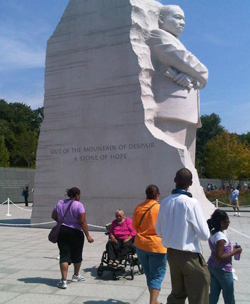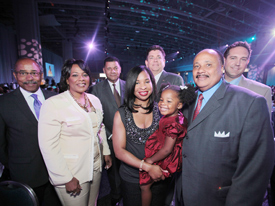
“When we view the negative experiences of life, the Negro has a double share. There are twice as many unemployed. The rate of infant mortality among Negroes is double that of Whites and there are twice as many Negroes dying in Vietnam as Whites in proportion to their size in the population.”
(FinalCall.com) – The above words by the Reverend Dr. Martin Luther King Jr. were made at his address to the Southern Christian Leadership Conference in 1967. In 1968, the year Dr. King’s life was cut tragically short by an assassin’s bullet, the unemployment rate for Black Americans was 8.8 percent and 44 percent for Black youth.
In 2011 Black unemployment is a staggering 16 percent for Blacks, 42 percent for Black youth. Dr. King’s dream is still a nightmare for the poor and disadvantaged he fought so hard to represent.
If Dr. King were alive today to witness the ascension of the nation’s first Black president, would his happiness at Barack Obama’s achievement be overshadowed by the glaring realities of a country engaged in three wars; where over 14 percent of its people live in poverty, and where there are now more Black men in the prison industrial complex than were enslaved in 1850?
The image of Dr. King, humanitarian, civil rights icon, voice for the poor, husband, father, and anti-war advocate is now immortalized in granite, in a towering 30-ft tall statue on the National Mall in the nation’s capital. Though the memorial dedication scheduled for August 28 was rescheduled pending the threat of Hurricane Irene, the unveiling of the statue was highly anticipated.
However, is this statue and memorial a fitting tribute that genuinely recognizes what Dr. King truly represented or has it become just another symbol in the continuous manipulation and distortion of a great man’s legacy?
Dr. King was maligned, ridiculed and shunned in life by the same country that now “celebrates” his life and work.

“When Martin died, 72 percent of Americans were against him and 55 percent of Black people disapproved of him, now see that story needs to be told,” Dr. Cornel West, Harvard University professor and best-selling author told The Final Call. In the 1960s, Dr. King was considered a radical and people distanced themselves from him especially when he began to speak out against the Vietnam War and poverty, says Dr. West.
Shortly after his death in 1968, the push to recognize his birthday as a national holiday began but faced fierce opposition. The bill was not signed into law until 1983 but was still not officially observed in every state until 2000.
U.S. Senator John McCain (R-Ariz.), former presidential candidate voted against the MLK holiday as a congressman in 1983, a vote he later said he regretted. Though as president, Ronald Regan, the man Republican politicians and Tea-Party loyalists still revere, eventually signed the bill making it a federal holiday; his endorsement of it was tepid at best.
“I think that for the most part you can easily argue that our country does not deserve Dr. Martin Luther King. We are every bit as hypocritical as the racist S.O.B’s in Louisville, Kentucky who honor Muhammad Ali when they were the ones who treated him so poorly while he was there and continue to promote oppression in that area that Ali grew up in,” says Dr. Boyce Watkins, founder of yourblackworld.com.
Dr. Watkins told The Final Call he decided not to attend the weekend events scheduled in D.C. because Dr. King should be honored with action and not symbolism, he says. “You can almost argue that you’re honoring Dr. King by not participating in the ceremony, at least that’s the way I interpret it,” says the Syracuse University professor.
“If in honoring Dr. King the government does nothing for the poor and the weak of this nation and continue to perpetuate war, their hearts are as cold as the granite used to make the statue of Dr. King,” said the Honorable Minister Louis Farrakhan of the Nation of Islam.
Minister Farrakhan called Dr. King a great advocate for the civil and human rights of Black people but said the world is not familiar with the body of knowledge the great civil rights leader left as his legacy.
When asked earlier this year in a radio interview on WTWG 1050AM Karriem & Co. about the state of Black America in the 47 years since the ’63 march, the Minister recounted a conversation in which legendary entertainer Harry Belafonte, a friend of Dr. King said the civil rights leader lamented, “I fear that I’m trying to integrate my people into a burning house.”
“Now, where are we 47 years later?” asked Min. Farrakhan. “In the state of Mississippi where we’re broadcasting from, there are some Black people living in virtual slavery, on plantations in Mississippi, in Louisiana, in Texas, and in other parts of the South. Things are not better; we are not living in a post-racial America,” the Minister added.
“Four decades after the Civil Rights movement, Blacks still earn only 57 cents and Latinos earn 59 cents for each dollar of White median family income,” according to United for a Fair Economy in its 2011 State of the Dream report in honor of Dr. King which examines issues of racial inequality in the U.S.
Many companies and individuals raised and contributed millions of dollars toward the memorial project, spearheaded by Alpha Phi Alpha Fraternity, the nation’s oldest Black Greek letter organization of which Dr. King was a member.
Wal-Mart, the world’s largest retailer reportedly provided a $12.5 million letter of credit to break ground for the memorial yet pays many of its workers less than $10 per hour, has been the subject of lawsuits alleging poor working conditions and 28 percent of Walmart purchase are by families that earn below 200 percent of the federal poverty level. Does this match up to what Dr. King was about? Would he have endorsed the $120 million memorial in his honor?
Dorothy Tillman, former Chicago alderman and civil rights pioneer, knew Dr. King and worked for his Southern Christian Leadership Conference as a field staff organizer as a teenager in the 1960s and says Dr. King would not care whether or not he had a statue.
“He understood that the movement wasn’t just about Dr. King. He understood it was about everybody who worked around him and with him that made it possible for him to do all the things that he did and he would have made sure that all of those people were involved in this,” Ms. Tillman told The Final Call. Ms. Tillman was in Washington, D.C. attending a pre-memorial pioneer’s luncheon before the memorial cancellation.
“It’s interesting to watch the people in the room who really do not understand who Dr. King was. I was telling a young lady that when Dr. King was in Washington, they didn’t want him to speak, he was too militant. He was not passive; they want to make him seem like he was a passive person … Dr. King was aggressive … he confronted things that were wrong; he stood up to the powers that be,” said Ms. Tillman.
Dr. West, while supporting the project, says there appears to be a combination of both honor and hypocrisy involved in the way people recognize Dr. King. “On the one hand flesh and blood in the form of service and sacrifice is one thing, stone and mortar in the form of statue and edifice is something else,” Dr. West told The Final Call.

“It is an honor to be in stone and mortar for what you did in flesh and blood but the hypocrisy is, so many of the people who are there to honor him refuse to come to terms with the challenge that Brother King embraced himself,” he added.The result is people confusing symbol for substance, says Dr. West.
Many of the values espoused by Dr. King continue to be ignored by those paying lip service to his legacy. Dr. Watkins argues many of the principles Dr. King dealt with like poverty, world peace, economic equality and true racial equality have been ignored even as his likeness looms larger than life in America’s capital.
In his now famous “I Have a Dream” speech in 1963, Dr. King told the world that Blacks in America were still crippled by the manacles of segregation and chains of discrimination and called the condition of the majority of Blacks in America “shameful.”
We have come to our nation’s capital to cash a check, he said. “Instead of honoring this sacred obligation, America has given the Negro people a bad check; a check which has come back marked ‘insufficient funds,’” he said.
Today, more than 40 years later, one in three Black and Latino children still live in poverty along with one in 10 White children. The median wealth of White household’s is 20 times more than that of Black households. Black youth are being gunned down in American cities not only by police but by other Black youth.
“Almost nothing Dr. King asked of America has actually been delivered. He gave us a homework assignment and we didn’t do our homework,” says Dr. Watkins.












